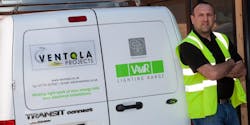The world has changed enormously in just a few short months. Nobody could quite have predicted how much of a transformation has already occurred and it will most likely be several years before we know the full extent of the impact of the ongoing coronavirus pandemic. But there are some lessons we can apply in the lighting industry, even at this relatively early stage, that can help us all on both economic and sustainability fronts.
Perhaps you’ve seen the footage of clear water running through Venice’s infamous Grand Canal. Maybe you’ve even spoken with your family about the air around us having something of a cleaner quality now, as there are fewer vehicles on the road. As time goes on, I’m sure we’ll find more ways this forced change to our behavior has led to change. They’re small comfort at this challenging time, but like many, I’m looking for the positives we can take from this experience.
While this is undoubtedly a human catastrophe, I firmly believe we should also look at this period as an ecological opportunity, a chance to build on the progress we have already made as a sector in making our operations and our products that little bit greener still. Widespread innovation in LED technology in recent years has made a significant difference to both residential and commercial energy bills and carbon footprints. But I believe we can go so much further both as individual businesses and as an industry collective.
Not only is the COVID-19 crisis creating health concerns, it’s also hitting us right in the pocket. Economic and commercial uncertainty is rife, so the pressure is on like never before to find savings. The lighting industry is particularly well placed to help people and businesses do just that. I’d urge you to take this time to perform a root-and-branch review of your processes, materials, and working practices.
At Ventola Projects, we’re in the middle of what we’re calling a research and development project, assessing how we can upgrade the lighting products we’ll be releasing into the US and Middle East markets later in the year to make them as “green” as possible. One avenue we’re investigating is the potential to source locally to help the community in our area and reduce the distances that components travel. We’re talking to our suppliers to explore ways they can increase the proportion of recyclable materials used in product manufacture. The response we’re getting is really encouraging.
We’ve had some positive conversations about making products quicker and easier to install, so we can spend less time on-site, and more robust, so we don’t have to travel back and forth quite so often to deal with service calls. At the moment, we have suspended our installation projects in the UK to comply with the current health guidance. But these efforts provide us the confidence to now promise customers that, wherever and whenever possible, we will endeavor to further expand mend and repair services, rather than replace or update components and products, in order to reduce the depletion of the planet’s valuable but finite resources. Many of these principles are part of what’s known as “the circular economy,” and they have the potential to expand our business while reducing costs and environmental impact.
We’re also applying the same logic to new business inquiries. In the past, more often than someone from our technical team would fly to overseas locations to initiate design visits. But in the current situation, we know that’s not possible, so we’re taking advantage of available technologies and encouraging clients to send us all the technical information they have — rendered images, photos, 3-D building plans, etc. — and we’re continuing to quote remotely. This strategy is already saving us two and sometimes three site visits in each case, so we’re going to carry on in the same vein after the lockdown. This will result in fewer air miles and hotel stays, less CO₂ emissions, and food waste, and no time spent idling in departure lounges. Our project costs will effectively lower as a consequence and we can pass on the savings to the customer. There’s no need to tell you how that goes down with them, so it’s good thinking all round.
We should also take note that the technology doesn’t stand still. There’s always something new to learn about better product longevity, improved energy efficiency, and new sustainable materials. I’d encourage you to evaluate how you currently do things and to leave no stone unturned. Focus on manufacturing and on product development, and speak with your partners to understand how you can help them do the same.
I’m proud of the role our industry has played in recent decades, alongside many other sectors, in pointing the way towards a better, brighter future. But there is so much more we can do as torchbearers. If we can all make these incremental changes to the way we work in the lighting industry, the multiplier effect will really start to kick in. And we can show the leadership that inspires other areas of the economy to follow us on the path.
Get to know our expert
MICK VENTOLA is the founder and managing director of Ventola Projects, the Leicestershire-based electrical installations and LED lighting specialist. He is one of the Department of International Trade’s export champions under the auspices of the Midland Engine and works with clients in the US leisure and entertainment sector, and with partners in Europe, the Middle East, and East Asia.





